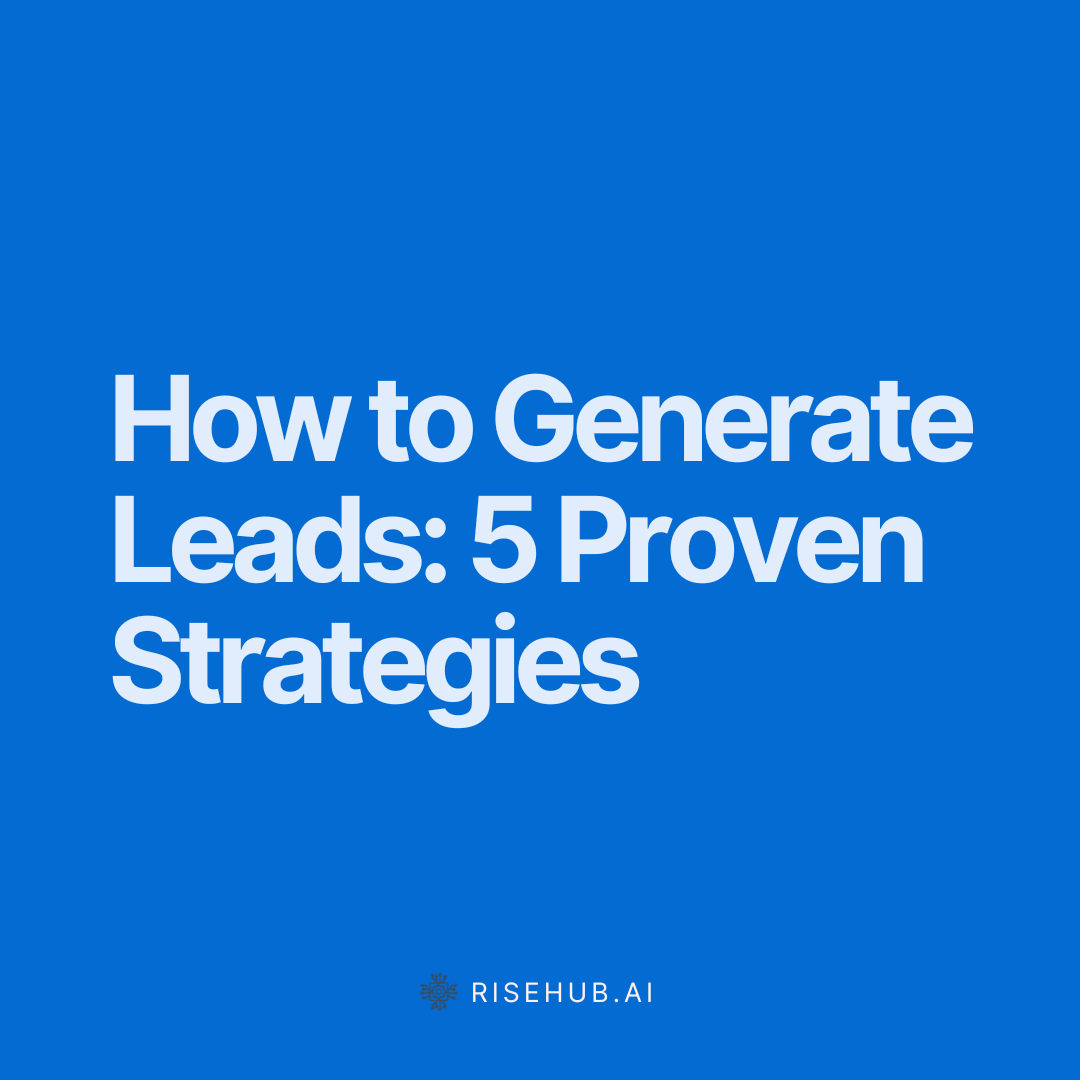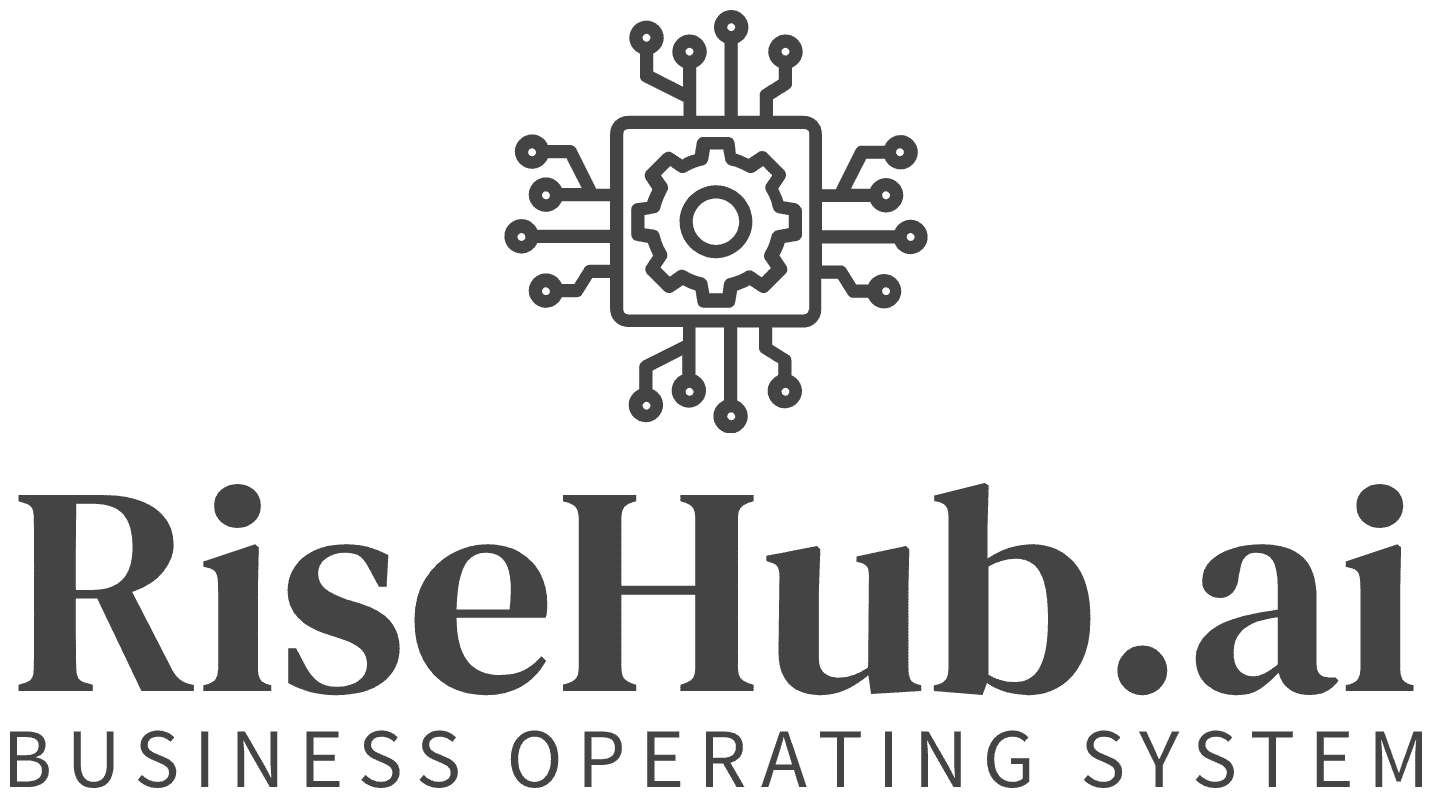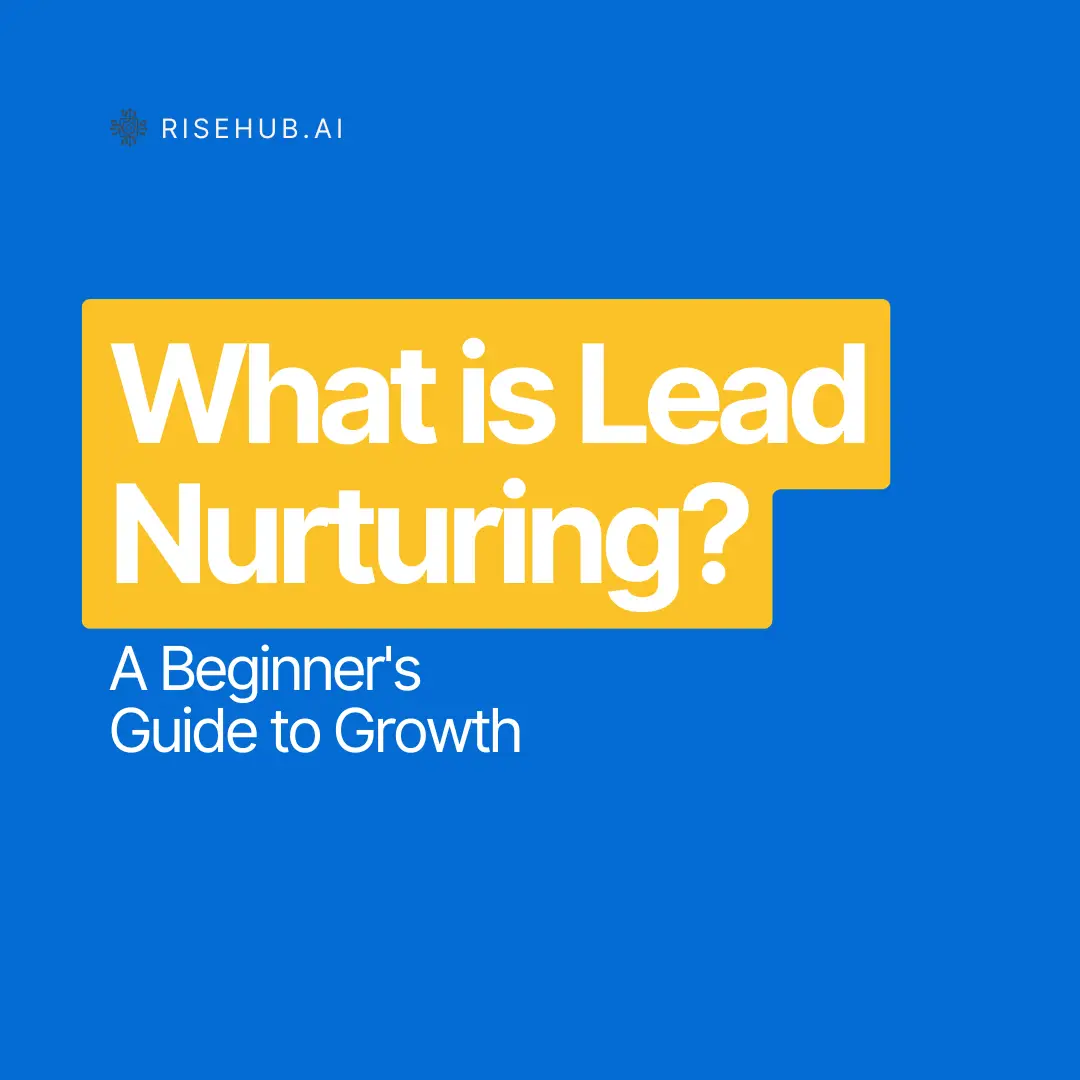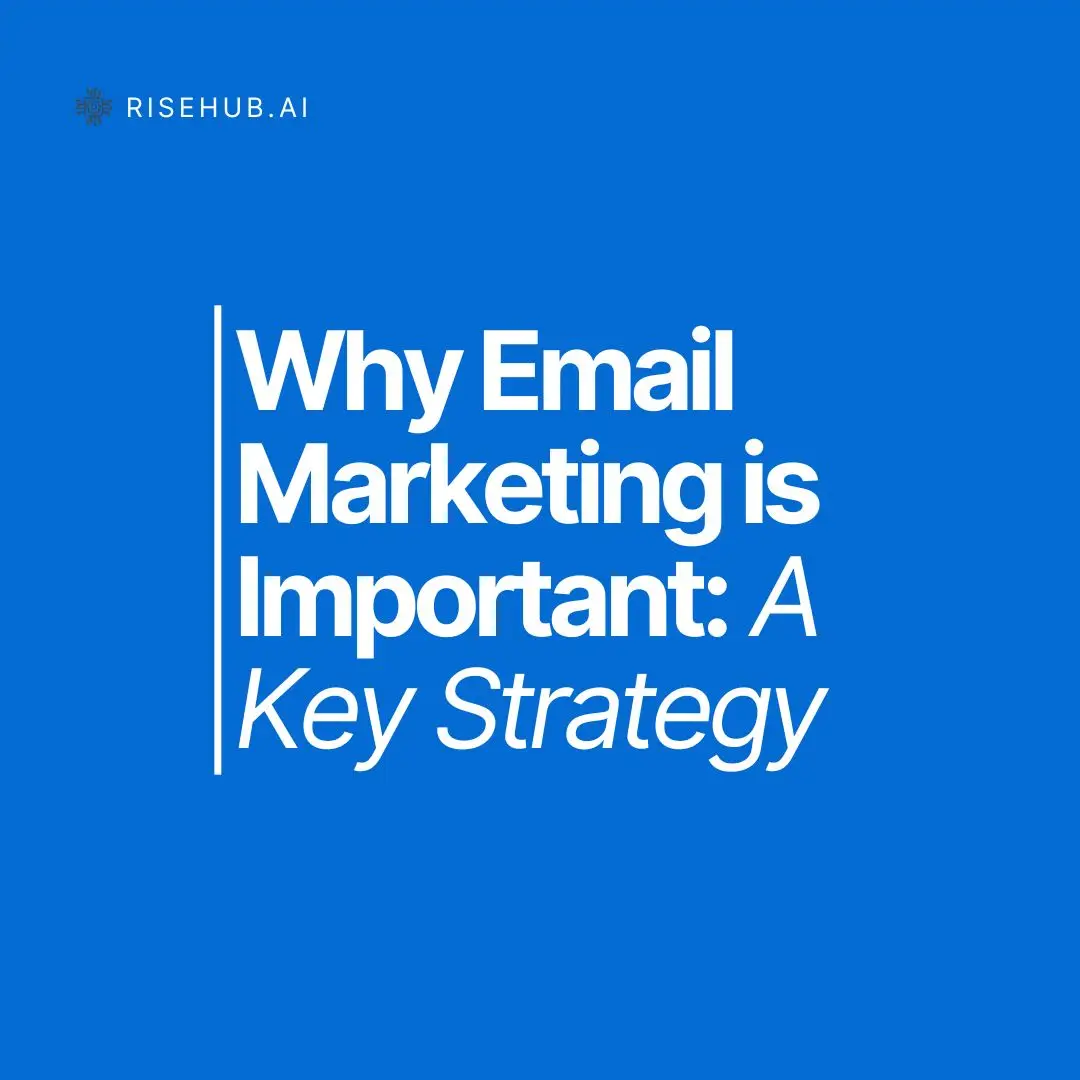
How to Generate Leads: 5 Proven Strategies
In this article, we’ll dive into five powerful lead generation strategies that have stood the test of time. From leveraging the power of content marketing to engaging with potential leads on social media, these approaches can help you attract, nurture, and convert more leads for your business. We’ll also explore the value of targeted email campaigns, face-to-face networking events, and paid advertising in your lead generation mix.
Whether you’re a startup looking to build brand awareness or an established company aiming to expand your customer base, these strategies can be tailored to suit your unique goals and target audience. By the end of this post, you’ll have a clear understanding of how to implement these lead generation techniques and start driving more qualified leads for your business.
So, let’s dive in and explore these five proven strategies to supercharge your lead generation efforts and take your business growth to the next level.
Understanding Lead Generation
Before we explore the five proven strategies, let’s take a moment to define lead generation and understand its significance in the sales process.
What is lead generation? Lead generation is the process of attracting and converting potential customers into leads, or individuals who have expressed interest in your product or service. This is typically achieved by capturing their contact information, such as an email address or phone number, in exchange for something of value, like an eBook, whitepaper, or webinar.
Leads vs. Prospects: It’s important to distinguish between leads and prospects. While all prospects can be considered leads, not all leads are prospects. A lead is someone who has shown initial interest in your offering, while a prospect is a lead that has been qualified based on certain criteria, such as their budget, authority, and timeline for making a purchase.
The Lead Generation Funnel: The lead generation process can be visualized as a funnel, with a large number of potential leads at the top and a smaller number of qualified prospects at the bottom. As leads progress through the funnel, they engage with your brand and content, moving closer to making a purchase decision. Effective lead generation strategies focus on attracting the right leads at the top of the funnel and nurturing them through the buying journey.
By understanding the fundamentals of lead generation, you can create targeted strategies that resonate with your ideal customer profile and guide them through the funnel towards conversion.
Now that we’ve established a foundation, let’s explore the first of our five proven lead generation strategies: content marketing.
How to Generate Leads; Strategy 1: Content Marketing
Content marketing is a powerful lead generation strategy that involves creating and sharing valuable, relevant, and consistent content to attract and retain a clearly defined audience. By providing content that addresses your target audience’s pain points, interests, and questions, you can establish your brand as a trusted authority in your industry and encourage potential leads to engage with your business.
Types of lead generation content:
There are many types of content you can create to attract and nurture leads, including:
- eBooks and whitepapers: In-depth guides that provide comprehensive information on a specific topic
- Webinars: Live or recorded online presentations that educate attendees on a particular subject
- Blog posts: Informative articles that address common questions or challenges faced by your target audience
- Infographics: Visual representations of data or information that are easy to digest and share
- Case studies: Detailed examples of how your product or service has helped real customers achieve success
Tips for creating content that converts:
To maximize the lead generation potential of your content marketing efforts, consider the following tips:
- Understand your target audience: Develop buyer personas that reflect your ideal customers and create content that speaks directly to their needs and interests. HubSpot’s guide on creating buyer personas provides a comprehensive approach to understanding and defining your target audience.
- Focus on educating, not selling: Provide genuine value to your audience without being overly promotional. Aim to build trust and credibility first, and the sales will follow. Check out this guide on content marketing strategy from HubSpot, which emphasizes the importance of educational content over direct selling.
- Optimize for search engines: Conduct keyword research to identify the terms your target audience is searching for, and optimize your content accordingly to improve visibility in search results.
- Include compelling calls-to-action: Guide your readers to take the next step, whether it’s downloading a resource, signing up for a webinar, or scheduling a consultation.
- Promote your content: Share your content on social media, via email, and through other channels to expand its reach and drive more traffic to your website.
By consistently creating and promoting valuable content, you can attract more qualified leads and guide them through the buying journey towards becoming loyal customers.
How to Generate Leads; Strategy 2: Social Media Engagement
In today’s digital age, social media has become an indispensable tool for businesses looking to generate leads and engage with potential customers. With billions of active users across platforms like Facebook, LinkedIn, Twitter, and Instagram, social media provides a vast opportunity to connect with your target audience and build meaningful relationships that can lead to conversions.
The role of social media in lead generation:
Social media plays a crucial role in lead generation by allowing you to:
- Increase brand awareness: By consistently posting valuable content and engaging with your followers, you can increase your brand’s visibility and reach a wider audience.
- Build trust and credibility: Sharing informative content, responding to comments and questions, and showcasing customer success stories can help establish your brand as a trusted authority in your industry.
- Drive website traffic: By including links to your website in your social media posts and profile, you can encourage potential leads to visit your site and learn more about your offerings.
- Collect leads directly: Many social media platforms offer lead generation features, such as Facebook Lead Ads, which allow you to collect contact information directly from interested users.
Best practices for engaging potential leads on social platforms:
To maximize the lead generation potential of your social media efforts, consider the following best practices:
- Know your audience: Understand which social platforms your target audience is most active on, and tailor your content and engagement strategies accordingly.
- Share a mix of content: Provide a balanced mix of informative, entertaining, and promotional content to keep your followers engaged and interested in your brand.
- Engage in conversations: Respond to comments, questions, and mentions in a timely and professional manner. Show your followers that you value their input and are committed to building relationships.
- Utilize social listening: Monitor mentions of your brand, industry keywords, and competitors to identify potential lead opportunities and gain valuable insights.
- Leverage paid advertising: Use social media advertising tools to target specific demographics, interests, and behaviors, ensuring your content reaches the most relevant audience.
The importance of consistent branding and messaging:
To build a strong and recognizable brand on social media, it’s essential to maintain consistent branding and messaging across all platforms. This includes using the same logo, color scheme, and tone of voice in your posts and profile. Consistency helps create a cohesive brand experience for your followers and makes it easier for potential leads to remember and trust your business.
By leveraging the power of social media and implementing these best practices, you can effectively engage with potential leads, build lasting relationships, and ultimately drive more conversions for your business.
How to Generate Leads; Strategy 3: Email Campaigns
Email marketing is a highly effective lead generation strategy that allows you to directly reach your target audience and nurture them through the buying journey. By crafting targeted email campaigns, you can build relationships with potential leads, provide valuable information, and encourage them to take action.
How targeted email campaigns can generate leads:
Targeted email campaigns contribute to lead generation in several ways:
- Attracting new leads: By offering valuable content or resources in exchange for contact information, you can use email campaigns to attract new leads and grow your email list.
- Nurturing existing leads: By providing relevant and informative content to your existing email subscribers, you can build trust, establish your authority, and guide them closer to making a purchase.
- Encouraging conversions: Email campaigns can be used to promote specific products, services, or offers, encouraging leads to take action and convert into customers.
Tips for crafting effective lead generation emails:
To create email campaigns that effectively generate and nurture leads, consider the following tips:
- Craft compelling subject lines: Your subject line is the first thing recipients see, so make sure it’s clear, concise, and enticing enough to encourage them to open your email.
- Provide value: Ensure your email content provides genuine value to your recipients, whether it’s through informative content, exclusive offers, or personalized recommendations. Learn how to craft value-driven emails with this guide on creating valuable email content by MailerLite.
- Use a clear call-to-action: Make it easy for recipients to take the desired action, such as downloading a resource, scheduling a consultation, or making a purchase, by including a clear and prominent call-to-action button.
- Optimize for mobile: With a growing number of people checking emails on their mobile devices, it’s crucial to ensure your emails are optimized for mobile viewing and interaction.
- Test and refine: Continuously test different elements of your email campaigns, such as subject lines, content, and calls-to-action, to identify what resonates best with your audience and improve your results over time. This article on A/B testing email campaigns by Optimizely offers insights into optimizing your emails through testing.
The importance of email list segmentation and personalization:
To maximize the effectiveness of your email campaigns, it’s essential to segment your email list and personalize your content:
- Segmentation: Divide your email list into smaller groups based on factors such as demographics, interests, behavior, or lead stage. This allows you to create more targeted and relevant content for each segment.
- Personalization: Use the data you’ve collected about your leads to personalize your email content, such as addressing them by name, recommending products based on their interests, or sending them content that aligns with their current stage in the buying journey.
By segmenting your list and personalizing your emails, you can create a more engaging and effective email marketing experience that resonates with your leads and drives better results for your business.
How to Generate Leads; Strategy 4: Networking Events
While digital marketing strategies are crucial for lead generation, face-to-face networking remains a powerful tool for building relationships and attracting potential customers. Attending industry events, conferences, and trade shows allows you to connect with prospects in person, showcase your expertise, and generate valuable leads for your business.
The value of face-to-face networking for lead generation:
Face-to-face networking offers several unique benefits for lead generation:
- Building personal connections: In-person interactions allow you to establish a more personal connection with potential leads, building trust and rapport that can be difficult to achieve through digital channels alone.
- Demonstrating expertise: Networking events provide opportunities to showcase your knowledge and expertise through speaking engagements, panel discussions, or one-on-one conversations.
- Gaining industry insights: Attending events allows you to stay up-to-date on industry trends, challenges, and opportunities, which can inform your lead generation strategies and help you better address your target audience’s needs.
Tips for making the most of networking events:
To maximize your lead generation efforts at networking events, consider the following tips:
- Set clear goals: Before attending an event, define what you hope to achieve, such as collecting a certain number of leads, securing speaking opportunities, or building relationships with key industry influencers.
- Prepare your elevator pitch: Develop a concise and compelling explanation of what your business does, the value you provide, and what sets you apart from competitors.
- Engage in meaningful conversations: Focus on building genuine connections with other attendees, asking questions, and listening actively to understand their needs and challenges.
- Collect contact information: Use a reliable system for collecting contact information from potential leads, such as exchanging business cards or using a lead capture app.
- Follow up promptly: After the event, follow up with the leads you’ve collected in a timely manner, while the conversation is still fresh in their minds.
How to follow up with leads after events
Effective follow-up is essential for turning event leads into customers. Here are some strategies for following up after a networking event:
- Send a personalized email: Within 24-48 hours of the event, send a personalized email to each lead, thanking them for their time and referencing specific points from your conversation.
- Provide value: In your follow-up, offer additional resources, insights, or information that address the lead’s specific needs or challenges, demonstrating your commitment to helping them succeed.
- Schedule a meeting: If appropriate, suggest scheduling a phone call, video chat, or in-person meeting to discuss further how your business can help solve their problems or achieve their goals.
- Add them to your email list: With their permission, add your event leads to your email list, ensuring they receive your ongoing content and offers.
By leveraging the power of face-to-face networking and implementing effective follow-up strategies, you can generate high-quality leads and build lasting relationships that drive long-term success for your business.
How to Generate Leads; Strategy 5: Paid Advertising
Paid advertising is a highly effective way to amplify your lead generation efforts and reach a larger, more targeted audience. By leveraging platforms like Google Ads and Facebook Ads, you can promote your content, offers, and resources to potential leads who are most likely to be interested in your products or services.
How paid advertising can boost lead generation efforts:
Paid advertising offers several key benefits for lead generation:
- Increased visibility: Paid ads allow you to reach a larger audience beyond your organic reach, putting your brand in front of more potential leads.
- Precise targeting: Advertising platforms offer sophisticated targeting options, allowing you to reach people based on demographics, interests, behaviors, and more, ensuring your ads are shown to the most relevant audience.
- Immediate results: Unlike organic lead generation strategies that can take time to gain traction, paid advertising can deliver immediate results, driving traffic and leads to your website from the moment your ads go live.
- Measurable ROI: Paid advertising platforms provide detailed analytics and tracking, allowing you to measure the return on your investment and optimize your campaigns for better performance.
Popular platforms for lead generation ads:
Two of the most popular and effective platforms for lead generation ads are:
- Google Ads: Google Ads allows you to place ads on Google’s search results pages and across its vast network of partner websites. By targeting specific keywords and phrases related to your business, you can reach people who are actively searching for solutions that your products or services provide. Read this to learn more about Google Ads.
- Facebook Ads: Facebook Ads enables you to promote your content and offers to a highly targeted audience on Facebook and Instagram. With advanced targeting options based on interests, behaviors, and demographics, you can reach potential leads who are interested in your business. Read this to learn more about Facebook Ads.
Tips for creating compelling ad copy and targeting the right audience:
To create paid advertising campaigns that effectively generate leads, consider the following tips:
- Develop a clear and compelling offer: Ensure your ad promotes a specific and valuable offer, such as a free trial, downloadable resource, or exclusive discount, that encourages people to click and provide their contact information.
- Write attention-grabbing ad copy: Craft ad headlines and descriptions that are clear, concise, and compelling, highlighting the key benefits of your offer and encouraging people to take action.
- Use eye-catching visuals: Include high-quality images or videos in your ads that grab attention and effectively communicate your message.
- Define your target audience: Use the targeting options available on each platform to define your ideal audience based on factors like age, location, interests, and behaviors, ensuring your ads reach the people most likely to convert.
- Monitor and optimize your campaigns: Continuously monitor your ad performance, analyzing metrics like click-through rate, conversion rate, and cost per lead. Use this data to optimize your targeting, ad copy, and offers for better results.
By incorporating paid advertising into your lead generation strategy and following these best practices, you can significantly boost your reach, attract more qualified leads, and ultimately grow your business.
Conclusion
In this article, we’ve explored five proven strategies for generating leads and growing your business:
- Content Marketing: By creating and sharing valuable, relevant content, you can attract potential leads, establish your authority, and nurture relationships with your target audience.
- Social Media Engagement: Leveraging the power of social media platforms allows you to increase brand awareness, build trust with your audience, and drive traffic and leads to your website.
- Email Campaigns: Targeted email campaigns enable you to directly reach your audience, provide valuable content, and guide leads through the buying journey towards conversion.
- Networking Events: Face-to-face networking at industry events and conferences provides opportunities to build personal connections, demonstrate expertise, and generate high-quality leads.
- Paid Advertising: Platforms like Google Ads and Facebook Ads allow you to amplify your lead generation efforts, reach a larger, targeted audience, and drive immediate results.
By implementing these strategies and adapting them to your unique business needs and goals, you can create a powerful lead generation engine that consistently attracts and converts potential customers.
We encourage you to experiment with these proven strategies in your own business. Start by identifying which strategies align best with your target audience and resources, and begin incorporating them into your marketing efforts. Remember to continuously monitor and analyze your results, making data-driven decisions to optimize your lead generation campaigns over time.



This was an amazing read! Your insights on this topic are very valuable and have given me a lot to think about. I appreciate the time and effort you put into researching and writing this post. Thank you for sharing your knowledge with us.
Thank you for this fantastic post! The information you provided is very useful and well-explained. I especially liked how you broke down complex concepts into easily understandable parts. Your writing is clear and concise, making it a pleasure to read. Looking forward to more of your posts.
Hi! I just finished reading your blog post, and I must say, it was excellent. Your ability to explain complicated concepts in a simple and engaging way is truly remarkable. Thank you for providing such valuable content. I can’t wait to read more from you in the future.
Thank you for this great post! I found the information you provided to be very helpful and well-explained. Your writing is engaging and easy to follow, making it a pleasure to read. I appreciate your hard work and dedication to creating valuable content. Keep it up!”
Hey! I stumbled upon your blog and this post really stood out to me. The way you explained the topic was clear and concise, making it accessible to readers of all backgrounds. Thank you for breaking it down in such an understandable way. Can’t wait to read more from you.
Hi! I just finished reading your blog post, and I must say, it was excellent. Your ability to explain complicated concepts in a simple and engaging way is truly remarkable. Thank you for providing such valuable content. I can’t wait to read more from you in the future.